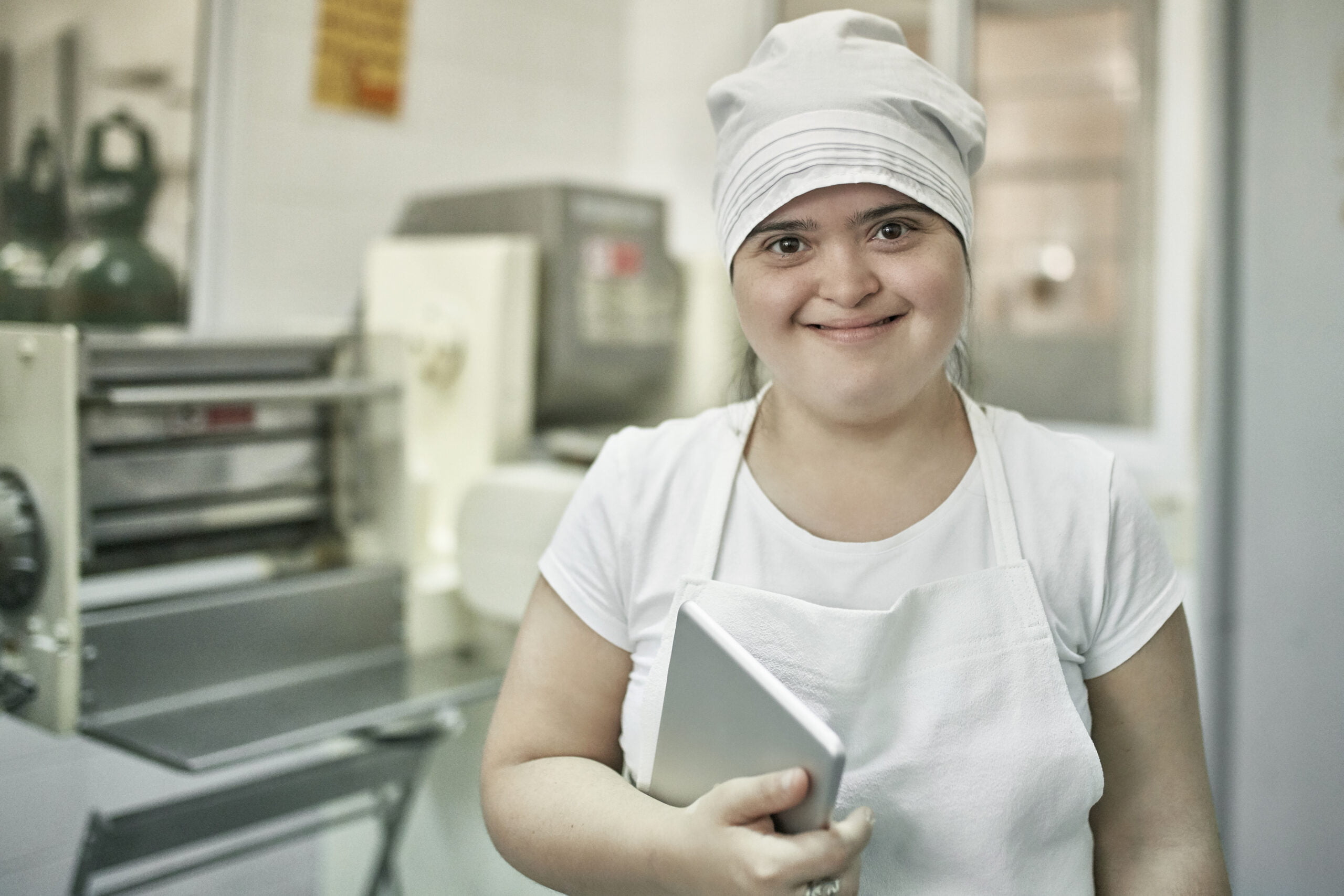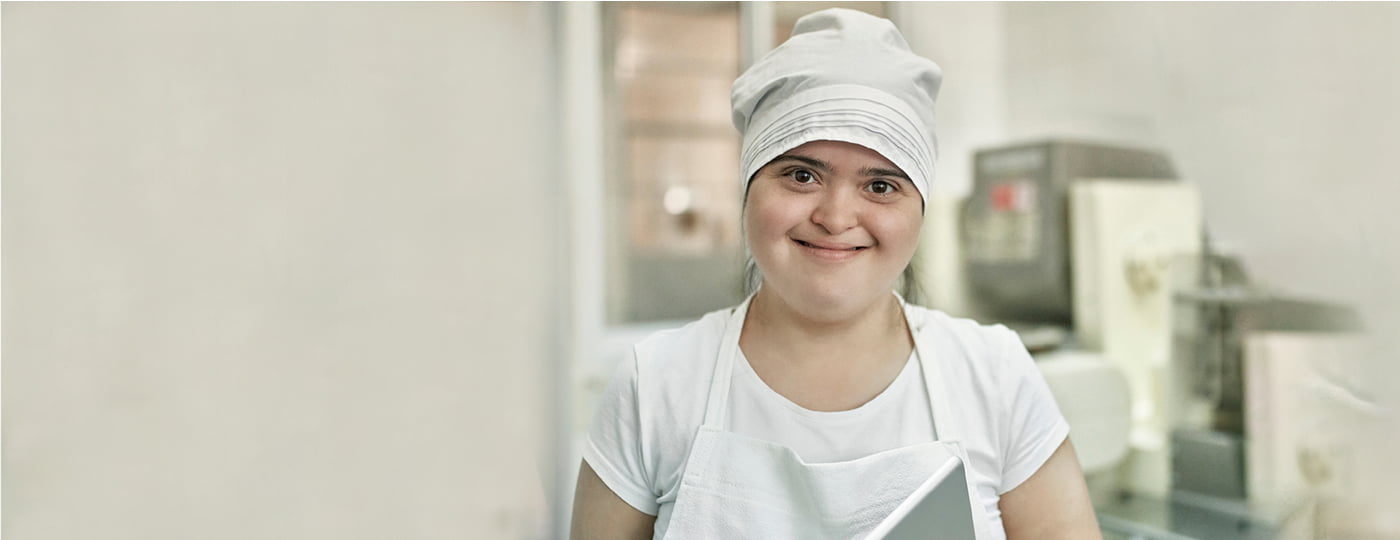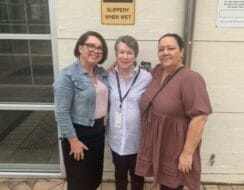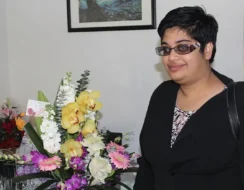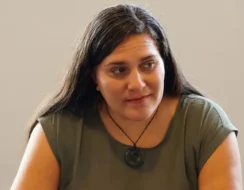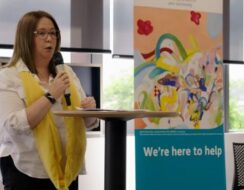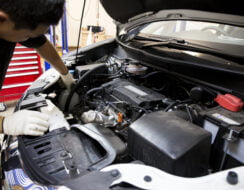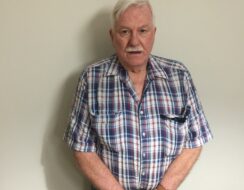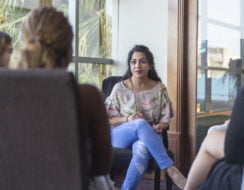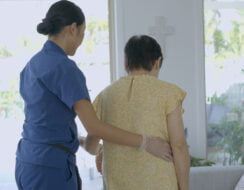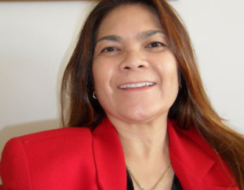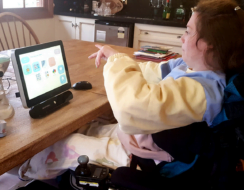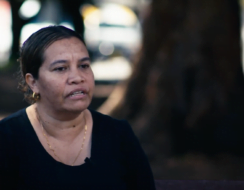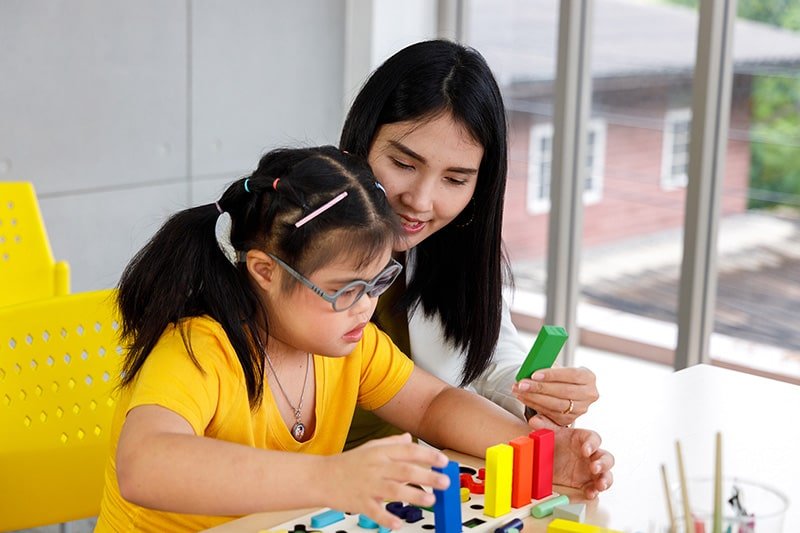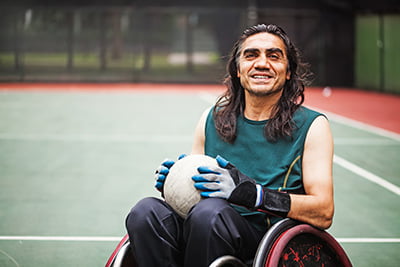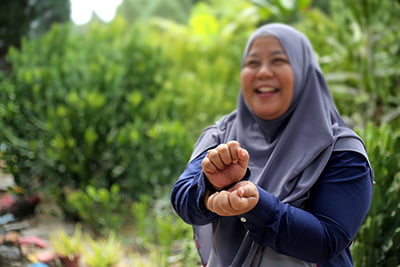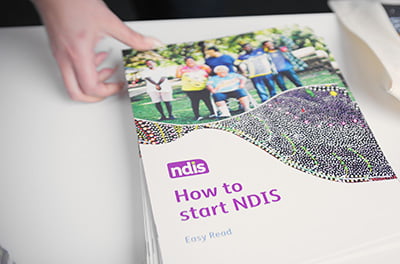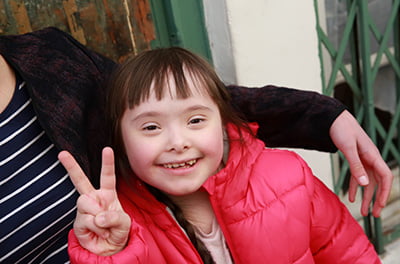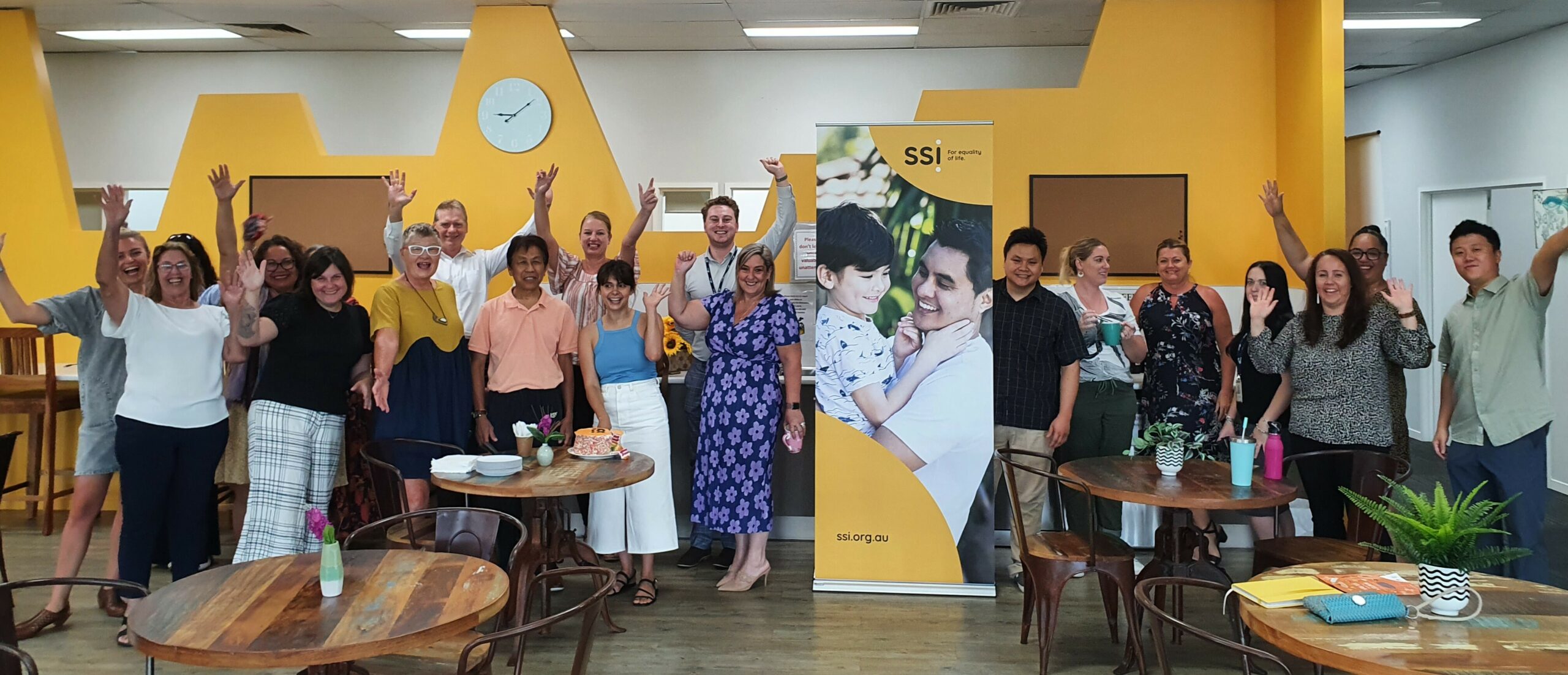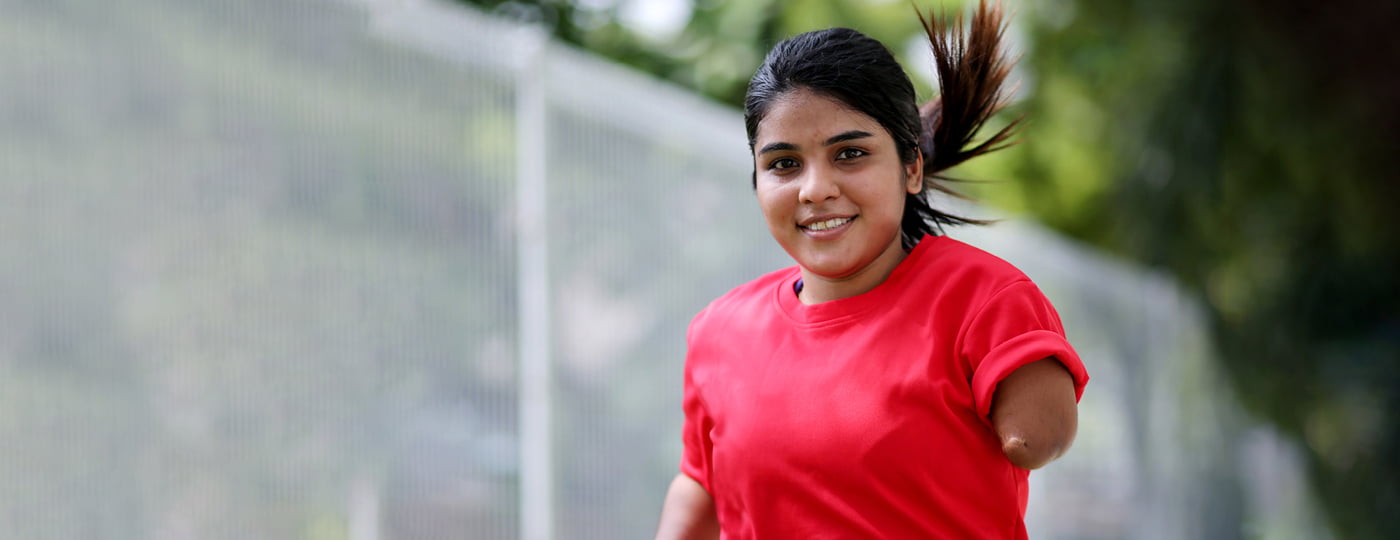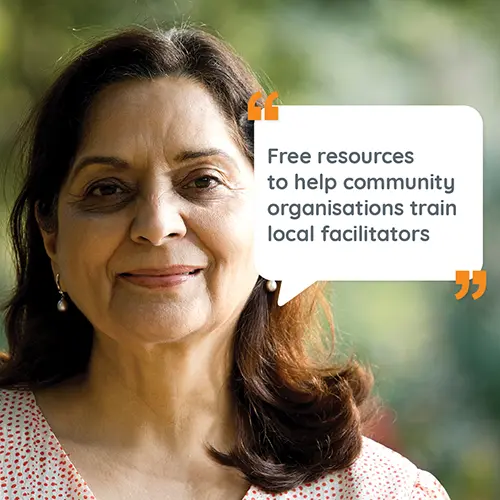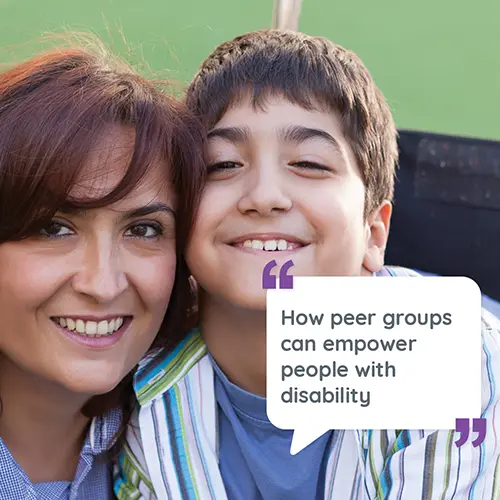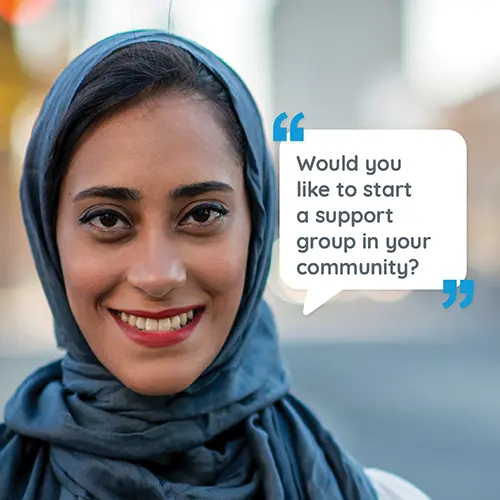अक्षमता के साथ जीवन बिताने के निजी अनुभव वाले लोगों के लिए, समुदाय से जुड़ना उनकी सकुशलता और ख़ुशी को बेहतर बनाने में महत्वपूर्ण योगदान देता है। इससे आपको नई योग्यताएँ पाने में, समान विचारों वाले लोगों से जुड़ने में और एक ऐसे जीवन के निर्माण में सहायता मिल सकती है जो आपके लिए आनंददायक हो।
अपने घर से बाहर गतिविधियों में हिस्सा लेना या ऑनलाइन ग्रुप्स के द्वारा वर्चुअली जुड़ना ही समुदाय से जुड़ना होता है। लोगों से मिलना-जुलना और अपनी पसंद के काम करना इसमें शामिल है।
हर व्यक्ति की आवश्यकताएँ अलग होती हैं, इसलिए अपनी सुविधानुसार संपर्क बनाए रखना ज़रूरी होता है। शुरुआत करने के लिए नीचे दिए गए साधनों के बारे में पता करें।
एक पीअर-टू-पीअर अक्षमता ग्रुप में शामिल होना, अतिरिक्त सहायता पाने और नए मित्र बनाने का अच्छा तरीका होता है।
इन नियमित बैठकों में, अक्षमता के साथ जीवन बिता रहे व्यक्ति अपनी-अपनी चुनौतियों और लक्ष्यों के बारे में बातचीत करने के लिए इकट्ठे होते हैं। वे उपयोगी परामर्शों को साझा करते हैं तथा राष्ट्रीय अक्षमता बीमा योजना (NDIS) की सेवाओं या कार्य-स्थल पर अक्षमता जैसे विषयों पर चर्चा करते हैं।
कई ऐसे ग्रुप्स भी होते हैं जिनमें अक्षम व्यक्ति की सहायता करने वाले परिवार के सदस्य या देखभालकर्ता भी जा सकते हैं।
इनमें हिस्सा लेने वाले लोगों की बातें सुनने के लिए यह वीडियो देखें कि एक ग्रुप में शामिल होने से उनको क्या-क्या लाभ हुए।

पीअर-टू-पीअर अक्षमता ग्रुप्स सामान्यतया अलग-अलग रुचियों या अलग-अलग प्रकार की अक्षमताओं पर आधारित होते हैं।
उदाहरण के लिए, कोई ग्रुप उन परिवारों के लिए हो सकता है जो किसी मानसिक रोगी की देखभाल करते हैं। तो कोई ग्रुप सेरेबल पाल्सी से ग्रस्त लोगों के लिए हो सकता है। ऐसे ग्रुप्स भी होते हैं जिनमें विशेष भाषाओं या पृष्ठभूमियों के लोगों की आवश्यकताओं का ध्यान रखा जाता है।
इनका कोई तय प्रारूप नहीं होता है, लेकिन बातचीत का प्रवाह बनाए रखने के लिए एक प्रशिक्षित सहायक सामान्यतया उपस्थित रहता है। कुछ अक्षमता ग्रुप्स ऑनलाइन मिलते हैं, तो कुछ व्यक्तिगत रूप से मिलते हैं। कुछ अक्षमता ग्रुप्स सप्ताह में एक बार मिलते हैं, तो कुछ महीने में एक बार मिलते हैं।
ये सभी ग्रुप्स समान अनुभवों वाले लोगों से जुड़ने के लिए एक अच्छा माध्यम होते हैं। इनसे आपको राष्ट्रीय अक्षमता बीमा योजना (NDIS) को समझने में, एक सहायता नेटवर्क बनाने में और नए कौशल सीखने में सहायता मिल सकती है।
- किसी ऐसे संगठन से संपर्क करें जो अक्षमता वाले लोगों की सहायता करता है।
- अपने सामुदायिक संगठनों या ग्रुप्स, स्थानीय प्रशासन, प्रार्थना स्थल या स्कूलों से पूछें
- आपकी भाषा में संचालित होने वाले अक्षमता ग्रुप्स के लिए ऑनलाइन खोज करें
सैटलमेंट सर्विसेज़ इंटरनेशनल (SSI) ने अपने समुदाय से जुड़ने के आपके प्रयासों में सहायता करने के लिए उपयोगी तथ्य-पत्रक तैयार किए हैं।
हर तथ्य-पत्रक में अक्षमता वाले लोगों को, उनके अपने समुदाय में जीवन का संपूर्ण आनंद उठाने में सहायता देने के लिए जानकारी दी गई है।
आप स्वयँ को या अपने मित्रों और परिवार वालों को अवगत कराने के लिए इनका प्रयोग कर सकते/ती हैं। आप अपने पीअर-टू-पीअर ग्रुप में बातचीत शूरु करने के लिए भी इनको अपने साथ ले जा सकते/ती हैं।
ये तथ्य-पत्रक छः भाषाओं में उपलब्ध है: अरबी, चीनी, नेपाली, हिंदी, स्पेनिश, और वियतनामीज़।
अक्षमता वाले लोगों के लिए नौकरियों के बारे में जानें और यह भी जानें कि नौकरी कैसे ढूँढी जा सकती है।
यह जानें कि आपकी बात दूसरों तक कैसे पहुँचाई जा सकती है और अक्षमता वाले लोगों के लिए पक्ष-समर्थन (एडवोकसी) कैसे किया जा सकता है।
यह जानें कि NDIS के लिए आवेदन कैसे किया जाता है और किस तरह की अक्षमता सहायताएँ उपलब्ध हैं।
सहायता मंडलियाँ उन लोगों का समूह होता है जो किसी एक व्यक्ति के लक्ष्यों और रुचियों का प्रचार करने में सहायता करने के लिए एकजुट होते हैं। यह जानें कि अपने आस-पास सहायता का एक घेरा कैसे तैयार किया जा सकता है।
यह जानें कि आपको समुदाय में एक स्वयँ-सेवक के रूप में काम क्यों करना चाहिए और आप इस काम में कैसे शामिल हो सकते/ती हैं।.
सैटलमेंट सर्विसेज़ इंटरनेशनल (SSI) ने 2020 में NSW में विभिन्न स्थानों पर बहुसाँस्कृतिक समुदायों में बहुसाँस्कृतिक पीअर नैटवर्क (MPN) नामक अक्षमता सहायता ग्रुप्स का संचालन किया था। उस कार्यक्रम को सामाजिक सेवाएँ विभाग (DSS) द्वारा निधिबद्ध किया गया था और वह कार्यक्रम 2023 के शुरुआती महीनों में बंद कर दिया गया।
उस कार्यक्रम के बंद हो जाने के बाद, SSI ने उस कार्यक्रम के दौरान तैयार किए गए साधनों से लाभ उठाते रहने के लिए अक्षमता वाले लोगों को सशक्त बनाने की माँग की। वे साधन अब निःशुल्क उपलब्ध हैं, और कोई भी व्यक्ति उनका उपयोग कर सकता है।
MPN प्रभावशाली, पीअर-नेतृत्व वाले समूहों का एक संग्रह था जिसने बहँ-साँस्कृतिक समुदाय के, अक्षमता के साथ जीवन बिता रहे लोगों के साथ-साथ उनके देखभालकर्ताऔं और परिवार वालों की आत्म-निर्भरता को बढ़ावा दिया।
आप उस कार्यक्रम के बारे में अधिक जानकारी यहाँ पर प्राप्त कर सकते/ती हैं।
अक्षमता वाले लोगों की सहायता करने वाले SSI कार्यक्रम और सहायक लिंक्स
इस वेबपृष्ठ में दिए गए साधनों, सहायक प्रशिक्षण या SSI द्वारा सामुदायिक संगठनों की सहायता करने के अन्य तरीकों के बारे में और अधिक जानने के लिए, community@ssi.org.au पर ईमेल करें।
NSW में SSI की अक्षमता सेवाओं के बारे में अधिक जानकारी के लिए, कृपया हमारे लोकल एरिया कोर्डिनेटर सेवाएँ पृष्ठपर जाएँ या silac@ndis.gov.au पर ईमेल करें।
SSI द्वारा अक्षमता वाले लोगों के लिए उनकी निजी ज़रूरतों के अनुसार रोज़गार सहायता उपलब्ध करवाई जाती है। अधिक जानकारी यहाँ प्राप्त करें या टीम को employment@ssi.org.au पर ईमेल करें।
उन सैंकड़ों लोगों के समुदाय में शामिल हों जो SSI के साथ आपके स्थानीय समुदाय के परोपकार के काम में जुटे हैं। स्वयँ-सेवक बनने के अवसरों के बारे में हमारे स्वयँ-सेवक पृष्ठपर जाकर पता लगाएँ या volunteer@ssi.org.au पर ईमेल करें।
对与身患残障的人士而言,融入社区大大益于他们提高生活质量和提升幸福度。融入社区可以帮助您学习新技能,认识志同道合者并建立您喜欢的生活。
融入社区就是要走出家门去参加各种活动或者上网参加线上小组。其中包括与他人打交道以及做自己感兴趣的事情。
每个人都有不同的需要,因此您需要用一种适合您的方式和外界保持联系。查看下方的资源,迈开第一步。
加入同辈间残障互助小组是一个可以获得额外的支持并结交新朋友的极好方法。
通过这些定期聚会,残障人士能走到一起畅谈各自的挑战和目标。他们会分享有用的建议并探讨国家残障保险计划(NDIS)服务或职场残障情况等话题。
家属和提供残障支持的照顾者也有相应的互助小组。
观看视频听小组参加者讲述他们在其中的受益。

同辈间残障互助小组通常以不同的兴趣或残障的类型为导向。
例如,某个小组可能面向精神病患护理家属。另一个小组可能面向脑瘫患者。此外还有面向特定语言和背景人士的小组。
没有固定形式,但通常会有经过培训的主持人确保发言不间断。有些残障小组会在线上聚会,有些则在线下聚会。有些残障小组每周聚会一次,有些则每月聚会一次。
所有小组都非常有助于经历相似的人士认识彼此。无论您是要了解国家残障保险计划(NDIS),建立支持网络还是学习新技能,这些小组都能帮到您。
- 联系残障人士支持机构
- 咨询您的社区组织或小组、地方政府、敬拜场所或学校
- 上网搜索以您的母语开展的本地残障互助小组
Settlement Services International (SSI) 制作了有用的信息说明书,帮助您参与社区生活。
每一份信息说明书都包含相关信息帮助残障人士在自己社区里过上充实的生活。
您可以通过这些材料帮助自己或家人和朋友了解更多信息。您也可以把这些材料带到同辈间互助小组进行交流。
这些说明书有六种语言版本:阿拉伯文、中文、尼泊尔文、印地文、西班牙文和越南文。
了解提供给残障人士的岗位以及如何找工作。
了解如何让别人听到您的声音以及为残障人士争取权益。
了解如何申请 NDIS 经费以及有哪些残障支持。
支持圈指的是为了推进某一个的目标与利益而走到一起的一群人。了解如何建立自己的支持圈。
了解为何您要投身社区志愿者工作以及如何参加
2020年, Settlement Services International (SSI) 在新州组织了多元文化社区残障支持群组,被称为多元文化同伴网络(MPN)。该计划通过社会服务部(DSS)获得资助,并于2023年初结束。
该计划结束后,SSI 努力帮助残障群体继续通过该计划所创造的资源获益。这些资源现已免费向公众开放。
MPN 旗下是一个个由残障人士领导、有影响力的互助小组,促进多元文化社区中残障人士及其照顾者和家人独立生活。
您可以 在这里 获得更多有关该计划的信息。
有用的链接以及为残障人士提供支持的 SSI 计划
如需详细了解本网页上的资源、引导员培训或者 SSI 如何以其他方式支持社区组织,请发送电邮至 community@ssi.org.au。
如需详细了解新州的 SSI 残障服务,请浏览我们的当地协调员服务页面或发送电邮至 ssilac@ndis.gov.au。
SSI 为残障人士提供个性化的就业支持。请在此处了解详情,或发送电邮给我们 employment@ssi.org.au。
加入数以百计的志愿者队伍,与 SSI 一同回馈当地社区。浏览我们的志愿者页面或发送电邮至 volunteer@ssi.org.au,了解志愿者机会。
description
بالنسبة للأشخاص الذين يعانون من إعاقة، يلعب الانخراط في المجتمع دورًا كبيرًا في تحسين رفاهيتهم وسعادتهم. فهو قد يساعدك على اكتساب مهارات جديدة، والتواصل مع أشخاص لديهم طريقة تفكير مماثلة وبناء حياة تستمتع بها.
الانخراط في مجتمعك يعني المشاركة في أنشطة خارج المنزل أو عبر الإنترنت ضمن مجموعات. وهو يتضمن الاختلاط بالناس وفعل الأشياء التي تستهويك.
لكل شخص احتياجات مختلفة، لذلك من المهم البقاء على تواصل مع المجتمع بالطريقة التي تناسبك. اطلع على الموارد أدناه قبل أن تبدأ.
يعد الانضمام إلى مجموعة أقران من ذوي الإعاقة طريقة جيدة للحصول على دعم إضافي وتكوين صداقات جديدة.
في هذه اللقاءات المنتظمة، يجتمع أشخاصٌ ذوو إعاقات للتحدث عن أهدافهم والتحديات التي تواجههم. فيشاركُ بعضُهم البعض نصائح مفيدة ويتحدثون في مواضيع مثل خدمات البرنامج الوطني لتأمين ذوي الإعاقة (NDIS) أو الإعاقة في مكان العمل.
هناك أيضًا مجموعات تسمح بحضور أفراد الأسرة ومقدمي الرعاية لذوي الإعاقة.
شاهد الفيديو لتسمع المشاركين ييتحدثون عن الفوائد التي حصلوا عليها من خلال الانضمام إلى مجموعة.

عادة ما تُقسّم المجموعات وفقًا لاهتمامات الأشخاص أو أنواع الإعاقات التي يعانون منها.
على سبيل المثال، قد تكون إحدى المجموعات مخصّصة للعائلات التي تقدم الرعاية لشخص مصاب بمرض عقلي. وأخرى للأشخاص المصابين بشلل دماغي. وهناك أيضًا مجموعات مخصّصة للأشخاص الذين لديهم لغات وخلفيات معينة.
لذا لا توجد صيغة محّددة، ولكن عادة ما يتواجد منسّق مدرَّب للتأكد من استمرارية المحادثة. تلتقي بعض المجموعات عبر الإنترنت، بينما يلتقي البعض الآخر وجهًا لوجه. كما تلتقي بعض المجموعات مرة واحدة في الأسبوع، وأخرى كل شهر.
- اتصل بمنظمة تدعم الأشخاص ذوي الإعاقة
- اسأل المنظمات أو المجموعات المجتمعية أو الحكومات المحلية أو دور العبادة أو المدارس
- ابحث على الإنترنت عن مجموعات محلية لذوي الإعاقة تتحدث لغتك
أعدّت خدمات التوطين الدولية (SSI) أوراق معلومات مفيدة لتسهيل رحلتك نحو الانخراط في المجتمع.
تحتوي كل ورقة معلومات على معلومات لمساعدة الأشخاص ذوي الإعاقة في الوصول إلى أقصى ما يمكن أن يحققوه في حياتهم ضمن مجتمعاتهم.
يمكنك استخدام هذه المعلومات لتثقيف نفسك أو أصدقائك وعائلتك. كما يمكنك إحضارها إلى مجموعة الأقران التي تنتمي اليها لبدء محادثة.
تتوفر أوراق المعلومات بست لغات: العربية والصينية والنيبالية والهندية والإسبانية والفيتنامية.
تعرّف على الوظائف الخاصة بذوي الإعاقة وكيفية العثور على عمل.
تعلّم كيف تجعل صوتك مسموعًا وتدافع عن الأشخاص ذوي الإعاقة.
دوائر الدعم هي مجموعات من الأشخاص الذين يجتمعون للمساعدة في تعزيز أهداف واهتمامات شخص واحد. تعلّم كيف تكوّن حلقة دعم من حولك.
دوائر الدعم هي مجموعات من الأشخاص الذين يجتمعون للمساعدة في تعزيز أهداف واهتمامات شخص واحد. تعلّم كيف تكوّن حلقة دعم من حولك.
اعرف لماذا ينبغي عليك التطوّع في المجتمع وكيف يمكنك المشاركة.
في عام 2020 أنشأت خدمات التوطين الدولية (SSI) مجموعات لدعم ذوي الإعاقة في المجتمعات متعددة الثقافات في جميع أنحاء ولاية نيو ساوث ويلز تُسمى شبكة الأقران متعددة الثقافات (MPN). وقد تم تمويل البرنامج من قبل دائرة الخدمات الاجتماعية (DSS)، لكنه انتهى في أوائل عام 2023.
بعد انتهاء البرنامج، سعت خدمات التوطين الدولية إلى تمكين الأشخاص ذوي الإعاقة لمواصلة الاستفادة من الموارد التي تم إنشاؤها ضمن البرنامج. وهذه الموارد متاحة الآن للجميع ويمكن الاستفادة منها مجانًا.
كانت شبكة MPN عبارة عن مجموعات دعم فعّالة يقودها الأقران بأنفسهم، وقد عززت الاستقلالية لدى الأشخاص الذين يعانون من إعاقات وينتمون إلى مجتمعات متعددة الثقافات، فضلاً عن مقدمي الرعاية لهم وأسرهم.
يمكن العثور على المزيد حول البرنامج هنا.
لمعرفة المزيد حول الموارد الموجودة على صفحة الإنترنت هذه، أو حول تدريب المنسّقين أو الطرق الأخرى التي تدعم بها خدمات التوطين الدولية المنظمات المجتمعية، أرسل بريدًا إلكترونيًا إلى community@ssi.org.au
لمزيد من المعلومات حول خدمات ذوي الإعاقة التي تقدمها خدمات التوطين الدولية في نيو ساوث ويلز، يرجى زيارة صفحة خدمات منسق المنطقة المحلية أو إرسال بريد إلكتروني إلى ssilac@ndis.gov.au
توفر خدمات التوطين الدولية دعمًا فرديًا لمساعدة ذوي الإعاقة على التوظّف. اطلع على المزيد هنا أو أرسل بريدًا إلكترونيًا إلى الفريق على العنوان employment@ssi.org.au
انضم إلى مجتمع مؤلف من مئات المتطوعين لرد الجميل إلى مجتمعك المحلي من خلال خدمات التوطين الدولية استكشف فرص التطوّع على صفحة التطوّع لدينا أو أرسل بريدًا إلكترونيًا إلى العنوان volunteer@ssi.org.au
For people with lived experience of disability, connecting with the community plays a big role in improving wellbeing and happiness. It can help you gain new skills, connect with like-minded people and build a life that you enjoy.
Connecting with your community is all about participating in activities outside your home or virtually through online groups. It includes socialising with people and doing things that interest you.
Everyone has different needs, so it’s important to stay connected in a way that suits you. Check out the resources below to get started.
Peer groups
Joining a peer-to-peer disability group is a great way to get extra support and make new friends.
In these regular meetings, people living with disability get together to talk about their challenges and goals. They share useful advice and discuss topics like NDIS services or disability in the workplace.
There are also groups open to family members and carers who provide disability support.
Watch the video to hear from participants what benefits they got out of joining a group.

FAQs
Peer-to-peer disability groups are usually based on different interests or types of disabilities.
For example, one group might be for families caring for someone with a mental illness. Another might be for people living with cerebral palsy. There are also groups that cater to specific languages and backgrounds.
There is no set format, but a trained facilitator is usually present to keep the conversation flowing. Some disability groups meet online, while others meet in person. Some disability groups meet once a week, while others meet every month.
All groups are a great pathway to connect with people who have similar experiences. They can help you understand the NDIS, build a support network and learn new skills.
Contact an organisation that supports people with disability.
Ask your community organisations or groups, local governments, places of worship or schools.
Search online for local disability groups available in your language.
SSI has created helpful fact sheets to support your journey towards connecting with community.
Each fact sheet has information to help people with disability make the most of their lives in their own communities.
You can use them to educate yourself or your friends and family. You could also bring them to your peer-to-peer group to start a conversation.
The factsheets are available in six languages: Arabic, Chinese, Nepali, Hindi, Spanish, and Vietnamese.
Factsheets in English
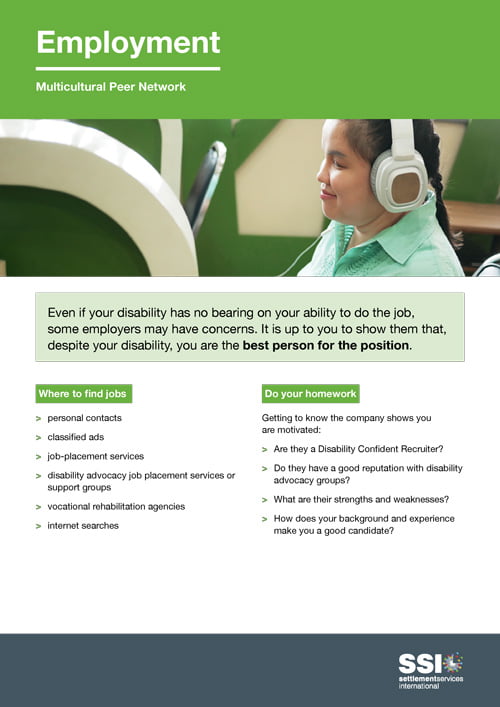
Learn about jobs for people with disability and how to find employment.
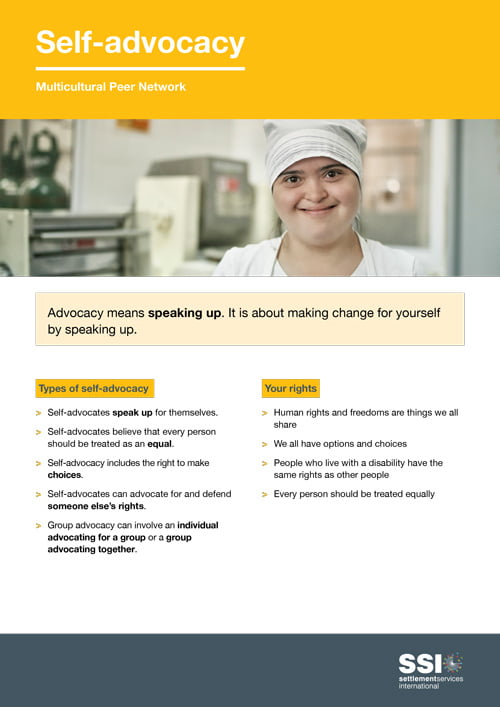
Learn how to have your voice heard and advocate for people with disability.
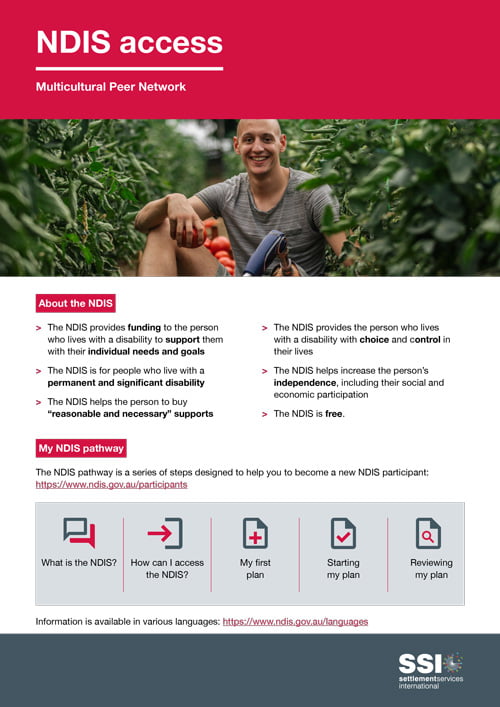
Learn how to apply for NDIS funding and what disability support is available.
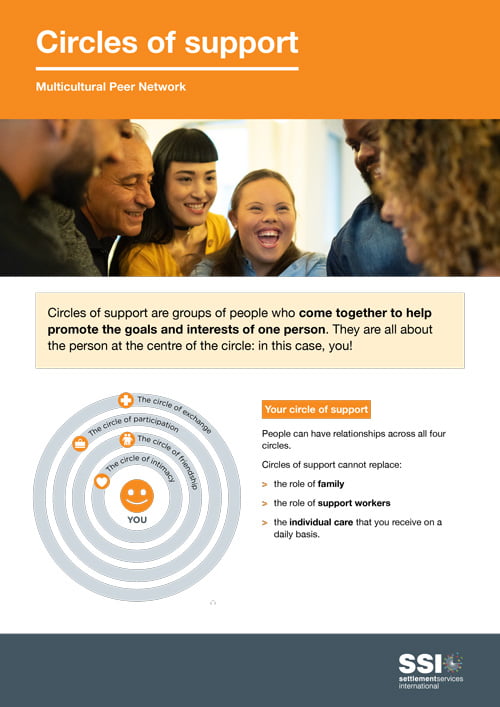
Circles of support are groups of people who come together to help promote the goals and interests of one person. Learn how to build a circle of support around you.
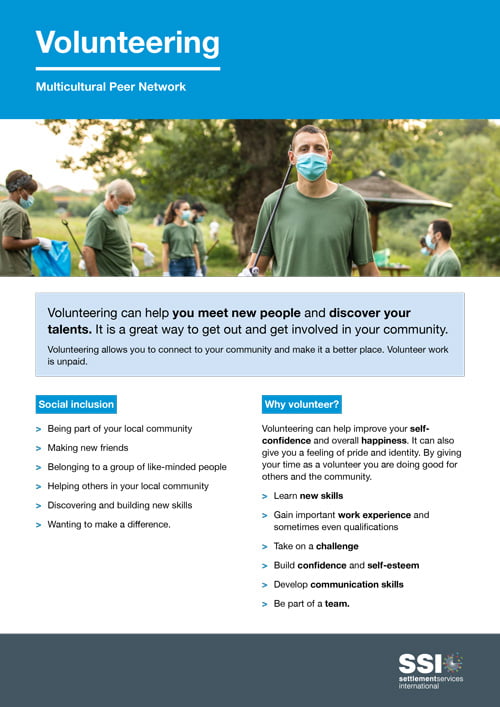
Learn why you should volunteer in the community and how to get involved.
Download guide books
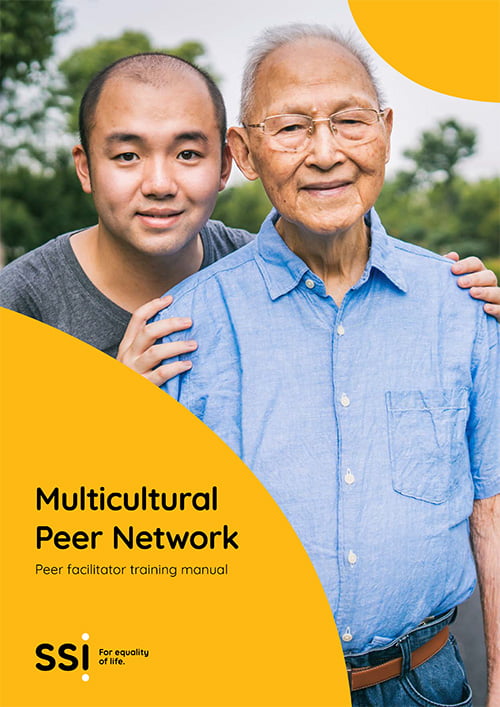
How to establish a group, basic facilitation skills, communication techniques, self-care and support systems.
View the NEW Training Manual – a new interactive page that designed to train facilitators how to run peer led support groups. It provides the knowledge needed to set up a group and develop the skills to take on a facilitator’s role in a visual and engaging way.
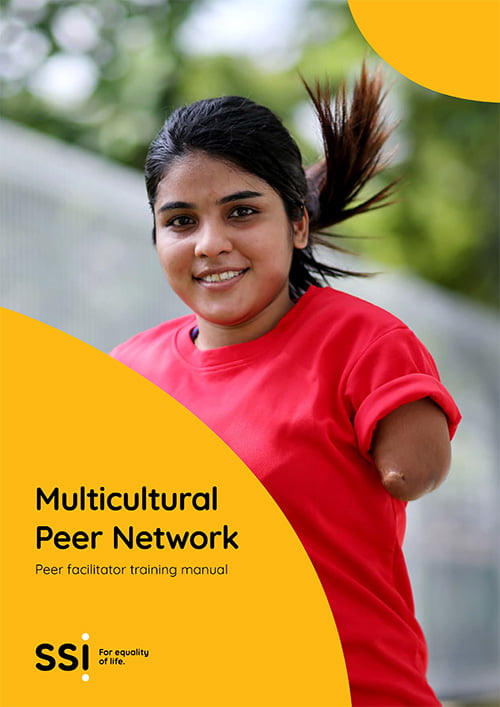
How to help people learn about self-advocacy, circles of support, volunteering, and employment.
Why were these disability support resources created?
In 2020, SSI started running disability support groups in multicultural communities across NSW called the Multicultural Peer Network (MPN). The program was funded through the Department of Social Services (DSS) and ended in early 2023.
After the program ended, SSI sought to empower the disability community to continue to benefit from the resources created during the program. These resources are now publicly available for anyone to use, free of charge.
The MPN was a collection of impactful, peer-led support groups which promoted independence among people with lived experience of disability from multicultural communities, as well as their carers and families.
Helpful links and SSI programs supporting people with disability
To learn more about the resources on this webpage, facilitator training or other ways SSI supports community organisations, email community@ssi.org.au.
For more information about SSI’s disability support services in NSW, please visit our Local Area Coordination services page or email ssilac@ndis.gov.au.
SSI provides personalised employment support for people with disability. Find out more or email the team at employment@ssi.org.au.
Join the community of hundreds of volunteers who give back to their local communities with SSI. Explore volunteering opportunities on our volunteering page or email volunteer@ssi.org.au.
Your Stories – Local area coordination
Our Local area coordination program supports participants along their NDIS journey, giving them the knowledge and confidence to access services that will potentially have positive life-changing impacts.
These are the stories about what has been made possible that was not previously possible.
Find out more
Get in touch
SSI delivers Local area coordination services to residents in:
Canada Bay, Leichhardt, Marrickville, Strathfield, Ashfield, Burwood, Sydney.
Bankstown, Camden, Campbelltown, Canterbury, Fairfield, Liverpool, Wingecarribee, Wollondilly.
Ashfield office (head office)
Monday – Friday
9am – 4:30pm
Level 2/158 Liverpool Rd, Ashfield NSW 2131
Liverpool office
Monday – Friday
9am – 4:30pm
Level 1/45 Scott St, Liverpool NSW 2170
Bankstown office
Monday – Friday
9am – 4:30pm
Level 2/462 Chapel Rd, Bankstown NSW 2200
Fairfield office
Monday to Thursday
9am – 4:30pm
7 William St, Fairfield NSW 2165
Picton office (Old Picton Post Office)
Monday – Friday
9am – 3pm
26 Menangle St, Picton NSW 2571
Campbelltown office
Monday – Friday
9am – 4:30pm
Suite 2 Level 6/138-154 Queen St, Campbelltown NSW 2560
Narellan office
Monday – Friday
9:30am – 4pm
Narellan Library, Corner Queen & Elyard St, Narellan NSW 2567
Local Area Coordination Events
Whether or not you’re eligible to receive NDIS support, SSI local area coordinators can help build the skills and knowledge of participants, families and carers to connect with mainstream services and community support networks.
As circumstances can change at short notice, please call ahead or email us to confirm SSI’s presence at these connection desks.
Upcoming events
Please see recurring events below for our ongoing upcoming events.
Airds Flexihub
Tuesday 9 December: 10am – 2pm
This connection desk is designed for parents and the wider community who need information on how to access the NDIS, the SSI local area coordination (LAC) program, and other support services in the community. We welcome families from all cultures, backgrounds, lands, and communities.
Tuesday 9 December: 10am – 2pm
Airds High School (Flexihub)
2 Briar Road, Airds NSW 2560
Please contact LAC Allana Das Neves for more information:
- Phone: 0481 909 210
- Email: allana.dasneves@ndis.gov.au
Recurring events
Tharawal Community Connection Desk (Airds)
Aboriginal Local Area Coordinators from SSI will attend Tharawal Aboriginal Medical Services on a fortnightly basis to assist any new or current NDIS participants with access or community connections needs.
All sessions are LGBTQIASB+ friendly.
Fortnightly on Wednesdays: 10am – 1pm
Tharawal Aboriginal Medical Services
Entrance via Deans Road, Airds NSW 2560
Please contact the SSI LAC Information team for more information:
- Phone: 1800 960 975
- Email: ssilac@ndis.gov.au
Miller Hub Connection Desk
This connection desk is designed for community members who need information on how to access the NDIS, the SSI local area coordination program, or details about other support services in the community.
All sessions are LGBTQIASB+ friendly.
Fortnightly on Wednesdays: 10am – 2pm
The Hub
16 Woodward Crescent, Miller NSW 2168
Please contact the SSI LAC Information team for more information:
- Phone: 1800 960 975
- Email: ssilac@ndis.gov.au
James Meehan High School Flexihub (Macquarie Fields
This connection desk is designed for parents and the wider community who need information on how to access the NDIS, the SSI local area coordination (LAC) program, and other support services in the community.
We welcome families from all cultures, backgrounds, lands and communities.
Fortnightly on Thursdays during school term: 9am – 1pm
James Meehan High School (FlexiHub)
58 Harold Street, Macquarie Fields NSW 2564
Please contact Aboriginal LAC Allana Das Neves for more information:
- Phone: 0481 909 210
- Email: allana.dasneves@ndis.gov.au
Redfern Community Hub
This connection desk is designed for people with disability who need information on accessing and navigating the NDIS, the SSI local area coordination (LAC) program, and other support services in the community.
Organisations such as Services Australia and the Redfern Legal Centre will also be in attendance.
Monthly on third Thursday of the month: 10am–3pm
Aboriginal Medical Service Redfern
36 Turner Street, Redfern NSW 2016
Please contact LAC Brittany Jackson for more details:
- Phone: 0466 085 000
- Email: brittany.jackson@ndis.gov.au
Wollondilly Services Hub (Tahmoor)
Access a range of supports and resources at this local services hub, including SSI local area coordinators to help with NDIS enquiries and information about community services. No bookings are required.
Organisations such as NSW Fair Trading, Centrelink and Service NSW will also be in attendance.
Every third Wednesday of every month: 10am-1pm
Tahmoor Community Centre
6 Harper Close, Tahmoor NSW 2573
Please contact LAC Allana Das Neves for more information:
- Phone: 0481 909 210
- Email: allana.dasneves@ndis.gov.au
Macarthur Homeless Community Hub (Campbelltown)
SSI local area coordinators attend this community hub to answer NDIS enquiries and link community members with local supports. Attendees can also get advice, assistance and referrals for housing, finances, employment, mental health, and many more services. No appointments required!
Every fourth Thursday: 10am – 12pm
Uniting Child, Youth and Family Services
6-8 Iolanthe Street, Campbelltown NSW 2560
Please contact LAC Salime Gossayn for more information:
- Phone: 0478 858 842
- Email: salime.gossayn@ndis.gov.au
Highlands Connection Desk (Bowral)
This connection desk is for community members who need information about the NDIS, the SSI local area coordination (LAC) program, and other support services in the community. We welcome individuals from all cultures, backgrounds, lands and communities.
Last Monday of every month: 10am – 2pm
Highlands Community Centre
2 Mona Road, Bowral NSW 2576
Please contact Aboriginal LACs Kerin Carpenter and Kylie Natividad for more information:
- Phone: 0434 724 500 (Kerin) / 0466 028 942 (Kylie)
- Email: kerin.carpenter@ndis.gov.au / kylie.natividad@ndis.gov.au
Find out more
Get in touch
SSI delivers Local area coordination services to residents in:
Canada Bay, Leichhardt, Marrickville, Strathfield, Ashfield, Burwood, Sydney.
Bankstown, Camden, Campbelltown, Canterbury, Fairfield, Liverpool, Wingecarribee, Wollondilly.
Ashfield office (head office)
Monday – Friday
9am – 4:30pm
Level 2/158 Liverpool Rd, Ashfield NSW 2131
Liverpool office
Monday – Friday
9am – 4:30pm
Level 1/45 Scott St, Liverpool NSW 2170
Bankstown office
Monday – Friday
9am – 4:30pm
Level 2/462 Chapel Rd, Bankstown NSW 2200
Fairfield office
Monday to Thursday
9am – 4:30pm
7 William St, Fairfield NSW 2165
Picton office (Old Picton Post Office)
Monday – Friday
9am – 3pm
26 Menangle St, Picton NSW 2571
Campbelltown office
Monday – Friday
9am – 4:30pm
Suite 2 Level 6/138-154 Queen St, Campbelltown NSW 2560
Narellan office
Monday – Friday
9:30am – 4pm
Narellan Library, Corner Queen & Elyard St, Narellan NSW 2567
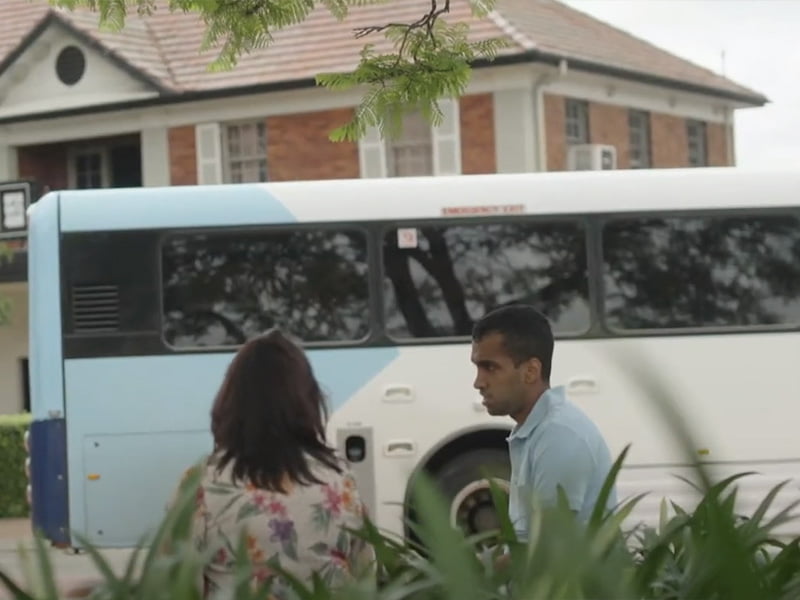
About local area coordination
All Australians have a right to a dignified and meaningful life. The National Disability Insurance Scheme (NDIS) provides funding to eligible people with disability to gain more time with family and friends, greater independence, access to new skills, jobs, or volunteering in their community, and an improved quality of life.
SSI partners with the National Disability Insurance Agency (NDIA) to deliver local area coordination services within two Sydney regions for people with disability 9 to 64 years of age, their families and carers. We are the first point of contact for people with disability to access the NDIS and other services and supports in the community. We also deliver community projects to support a more inclusive and equitable society.
How we help



Get in touch
SSI delivers local area coordination services to residents in:
Sydney (Burwood, Canada Bay, Canterbury-Bankstown, Inner West and Strathfield Local Government Areas (LGAs))
South West Sydney (Camden, Campbelltown, Fairfield, Liverpool, Wingecarribee and Wollondilly LGAs)
P: 1800 960 975
E: ssilac@ndis.gov.au
Ashfield office (head office)
Monday – Friday
9am – 4:30pm
Level 2/158 Liverpool Rd, Ashfield NSW 2131
Liverpool office
Monday – Friday
9am – 4:30pm
Level 1/45 Scott St, Liverpool NSW 2170
Bankstown office
Monday – Friday
9am – 4:30pm
Level 2/462 Chapel Rd, Bankstown NSW 2200
Fairfield office
Monday – Thursday
9am – 4:30pm
7 William St, Fairfield NSW 2165
Picton office (Old Picton Post Office)
Monday – Friday
9am – 3pm
26 Menangle St, Picton NSW 2571
Campbelltown office
Monday – Friday
9am – 4:30pm
Suite 2 Level 6/138-154 Queen St, Campbelltown NSW 2560
Narellan office
Monday – Friday
9:30am – 4pm
Narellan Library, Corner Queen & Elyard St, Narellan NSW 2567
If you have any questions or enquiries specifically about the NDIA and not LAC, please contact the NDIA Contact Centre on 1800 800 110.
If you are experiencing a medical emergency, please dial 000.
If you are having thoughts of suicide, please call Lifeline on 13 11 14.
If you need a language interpreter, call TIS National on 131 450. If you are deaf, hard of hearing and/or have a speech impairment, contact the National Relay Service.
Your feedback is important to us. Whether it’s a complaint, compliment or a suggestion on how we can improve our service, we want to hear from you.
FAQs
Does SSI have experience working with people from an Aboriginal or Torres Strait Islander background?
Yes. SSI has worked with Aboriginal and Torres Strait Islander people through initiatives, including Ability Links and the development of the organisation’s Reconciliation Action Plan.
SSI recognises the importance of engaging with Aboriginal and Torres Strait Islander people through a respectful and collaborative approach. The organisation will continue to seek first-hand guidance to build on our knowledge of First Nations communities to create sustainable, respectful and equitable service delivery.
Does SSI have experience working with people from culturally and linguistically diverse (CALD) backgrounds?
Yes. SSI has more than 135 bilingual guides and many bilingual staff. Collectively we speak over 100 languages and dialects and can often provide support – written and spoken – in the language of your choice when you need it. Where possible we aim to provide translated resources and can organise interpreters.
How can I find employment opportunities with SSI local area coordination?
We are committed to being an Equal Opportunity Employer and since we work with people from diverse cultural and social backgrounds with varied life experiences, physical abilities and skills we encourage applications from people of culturally and linguistically diverse backgrounds, including people from Aboriginal & Torres Strait Islander heritage and people with lived experience of disability.
If you are interested in applying for a position, please check current vacancies.
Am I eligible to receive NDIS support?
Check your eligibility on the NDIS website. For more information, you can contact the NDIS on 1800 800 110.
How can I make a complaint about LAC services?
If you wish to make a complaint about an issue arising out of, or in connection to LAC services, information on how to do so can be found on the NDIS Quality and Safeguards Commission website. You can also find more information about your rights as an NDIS participant via The Rights Path Project. Easy-to-understand resources are available in English, Khmer, Punjabi, Urdu and Vietnamese.
What if I have an NDIS enquiry for a child aged 0-8 years?
We suggest getting in touch with EACH (South West Sydney) or Lifestart (Sydney). You can learn more about Early Childhood Partners on the NDIS website.
About SSI Gateway
In 2016, we heard the voices of the community and introduced a Gateway community space for locals to drop in and receive information, advice or referral.
The Gateway continues to coordinate from an integrated response model, whereby local services outreach from the centre and collaborate on strategies around local community issues. We facilitate a number of internal programs for improving the economic and social participation of newly arrived communities. The SSI Gateway can be booked to run events and other community-focused work.
There are several large training rooms and small interview rooms available to hire via our external booking process.



Get in touch
To find out more about what’s on at SSI Gateway or to enquire about booking space for your next event/workshop/meeting, please either drop in, email or phone us.
SSI Gateway is located at 91 Wembley Road, Logan Central, QLD
E: acsl.gatewayofficer@ssi.org.au
P: 07 3412 8222
Monday – Friday 8.30am – 4.30pm
Start your own peer-to-peer support group
Peer-to-peer support groups are a powerful way to connect people with disability to information that can greatly improve their lives. They also play an important role in bringing the disability community together to advocate for themselves and others.
The best part about these groups? Anyone can start one. With the right tools and resources, you can create a safe space for people with lived experience of disability to connect with each other, access advice, learn skills and become more independent.
Read on to find out how to form a peer-to-peer support group in your community and what free resources and training SSI now offers for community organisations to upskill and run their own groups.
For more information on the Multicultural Peer Network, email community@ssi.org.au.
What success looks like: Multicultural Peer Network
In 2020, SSI created a successful model for running disability support groups in multicultural communities across NSW called the Multicultural Peer Network (MPN).
The MPN was a collection of impactful, peer-led support groups which promoted independence among people with lived experience of disability from multicultural communities, as well their carers and families.
The program was funded through the Department of Social Services (DSS).
During the MPN program, SSI found tailoring disability support groups to different cultures, languages and interests had a vastly positive impact on people with disability in these spaces.
Watch the project wrap video to learn more and hear from the facilitators

Our results
71
community leaders
recruited and trained as peer group facilitators
1,000
program participants
supported across over 97 networks in 15 languages
92
of program participants
and 87% of family members and carers reported an increase in confidence
With a focus on guiding participants on advocacy and helping them gain new skills, 84% of participants agreed they were more knowledgeable about their rights and 85% felt they had new skills to help them achieve their goals.
With the resources from the MPN program now publicly available, community leaders and organisations can be empowered to start their own peer groups.
How to start your own peer-to-peer support group
Peer-to-peer support groups are an engaging way to help like-minded people with disability build their support networks.
The purpose of these groups is to bring the disability community together to talk about their challenges and goals. The groups meet on a regular basis to discuss chosen topics and skills, like finding employment or using NDIS services.
Each group is tailored to the needs of the people attending. They can be delivered in person or virtually, in varying languages or focus on a specific type of disability.
Peer-to-peer support groups are usually run by a facilitator who helps guide the conversation and keep it flowing.
The facilitator also plays an important role in making sure the support group remains a safe space for everyone to share their thoughts.
There are no set rules for running a support group, but our facilitator guides provide useful information to help you get started.
SSI offers its comprehensive facilitator training guidebooks for any organisation to use to train staff, members, or volunteers to run their own peer groups.
Guide Book 1 gives you the knowledge needed to set up a peer support group and develop the skills to take on a facilitator’s role.
Once you have set up a group, you can use Guide Book 2 as a template for running the conversations around important topics.
Guide Book 2 covers four suggested conversation areas with questions advice and examples to help the group learn more about each area. The topics include themes like ‘how to build a circle of support’ or ‘how to build your skills towards employment’ – all aimed at building capacity of the individual and group.
Download guide books
View the NEW Training Manual – a new, free interactive way to learn how to run peer led support groups.

How to establish a group, basic facilitation skills, communication techniques, self-care and support systems.
View the NEW Training Manual – a new interactive page that designed to train facilitators how to run peer led support groups. It provides the knowledge needed to set up a group and develop the skills to take on a facilitator’s role in a visual and engaging way.

How to help people learn about self-advocacy, circles of support, volunteering, and employment.
In this video, hear from the MPN Program coordinator Susie who gives an overview of the two facilitator guides and how best to use them in discussion groups.

Free resources and facilitator guides
Facilitator training
SSI offers free facilitator training for community organisations and individuals interested in starting their own community peer groups deepening their facilitator skills.
To learn more about the resources on this webpage, facilitator training or other ways SSI supports community organisations, email community@ssi.org.au.
Facilitator guides
These facilitator guides are designed for community organisations to use as a handbook for workshop facilitation and to gain valuable skills in facilitating group discussions.
Book 1: The MPN Model provides an overview of the practice model for engaging with people of CALD backgrounds and disability, including an in-depth explanation of the key principles of the model, their outcomes, and capacity building in utilising this model. View the NEW Training Manual – a new, free interactive way to learn how to run peer-led support groups.
Book 2: This guide is a compilation of resources that can be used by peer facilitators to run a peer group, including how to help people learn about self-advocacy, circles of support, volunteering, and employment.
SSI disability support services
For more information about SSI’s disability support services in NSW, please visit our Local Area Coordination services page or email ssilac@ndis.gov.au.
MPN Supporter Kit – New available resource
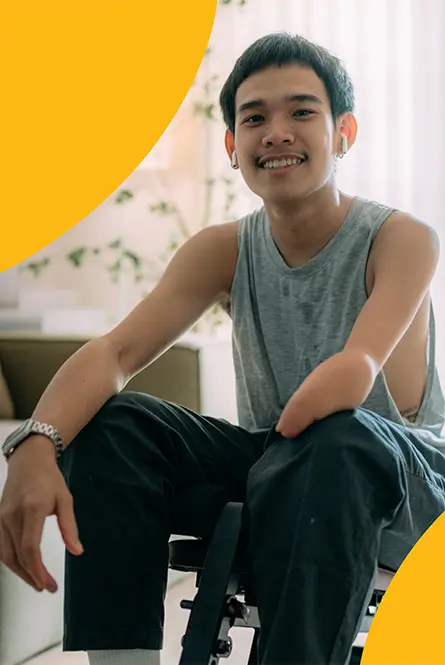
How to run peer-to-peer support groups.
Social media tiles for facilitators – New available resource
Get in touch
About 99 Steps program
At 99 Steps our team of domestic and family violence practitioners provides culturally responsive and trauma-informed support to women from culturally and linguistically diverse backgrounds experiencing domestic and family violence in the Logan and Beenleigh area.
99 Steps is a specialised service for women from refugee/asylum seeker backgrounds or women living in community on a temporary visa. We understand the unique barriers faced by women in diverse communities, and our mission is to empower and support them on their journey towards safety and healing.
How we can help
99 Steps can provide tailored support to meet the specific cultural and linguistic needs of women experiencing domestic and family violence:
Emotional Support
- Building awareness of domestic and family violence
- Education around healthy relationships
- Empowering women to self-advocate
- Fostering resilience through trauma informed practice
Practical Support
- Safety/Exit planning
- Referrals to crisis services and emergency shelters
- Referrals to legal support services
- Referrals to housing services
- Referrals to case management services
- Referrals to health and counselling services
Get in touch
To make an appointment:
P: (07) 3412 8282
E: acsl.99Steps@ssi.org.au
Monday to Friday 8.30am – 4.30pm
If you need urgent assistance, please phone 000. If you are in need of immediate safe accommodation, please phone DV Connect on 1800 811 811.

